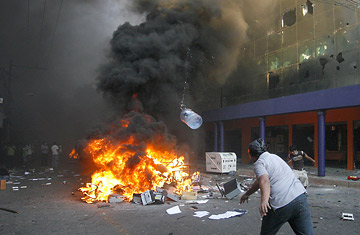
A Bolivian anti-government protester throws a bottle during a protest in Santa Cruz.
In a bold challenge to Washington, Bolivia's President Evo Morales has declared U.S. Ambassador Philip S. Goldberg persona non grata in his country, and requested that he be expelled. The surprise announcement is based on government allegations, as yet undocumented, that Goldberg has fomented civil unrest in South America's poorest country.
"Without fear of the [U.S.] empire, I stand before the Bolivian people today and declare United States Ambassador Mr. Goldberg persona non grata," Morales said Wednesday afternoon, in a speech inaugurating a youth employment program. "We don't want people here who conspire against our unity. We don't want people who threaten our democracy."
A lengthy statement released by Morales' ruling Movement Towards Socialism (MAS) party claimed that "the United States is carrying out an attempt to overthrow the government of President Evo Morales." It accuses Goldberg of being the architect behind an ongoing regional conflict between Bolivia's western highlands and eastern lowlands, which has been boiling over into violence in recent months.
Citing the ambassador's previous role as the U.S. State Department's Bosnia desk officer from 1994 to 1996 and then Chief of Mission in Kosovo from 2004 until 2006, the MAS statement accuses Goldberg of being "an expert in encouraging separatist conflicts." It chronicles clandestine meetings between the Ambassador and rightwing political and business leaders, and claims that Goldberg had arranged for a media "dirty war" against Morales and is now encouraging the violent takeover of government institutions to force out the president.
Thomas Shannon, the U.S. Assistant Secretary of State for Western Hemisphere Affairs, told Spanish news service Efe that Goldberg was a "diplomat of impeccable conduct" and called the expulsion "a big mistake." Though the move is likely to play well with supporters of Morales, not everyone in Bolivia was convinced, given the absence of any documents, recordings or sworn testimony to back up the allegations.
"The government is looking for an external enemy," said Doria Medina, the leader of the opposition National Unity party. "This is not going to resolve Bolivia's internal problems."
Those internal problems are daunting by all accounts. Since Morales' historic win in 2005 to become Bolivia's first indigenous President, political conflict has been rising between country's indigenous majority and an entrenched European-descended elite.
The demands of the elite have gelled into "autonomy," meaning greater regional control over everything from land ownership to police to gas revenue royalties. The four departments, or states, of Tarija, Beni, Pando and Santa Cruz held non-legally sanctioned referendums earlier this year, approving their own autonomy statutes. Though these statutes have not yet been implemented, they have led the opposition to reject the newly written constitution, which is key to Morales' efforts to redress what his supporters see as centuries of domination over indigenous Bolivians.
On Aug. 10, Bolivians voted on recalling their political leaders in what was supposed to have been a democratic means to release the country's growing political tension. Instead it appears to have only heightened the polarization; Morales was given a 67% approval vote nationally, but four opposition prefects (or governors) garnered equally high or higher approvals in their respective states.
Meanwhile, violence is on the rise. In eastern cities, young men wave autonomy flags while they wield bats against indigenous women in traditional dress. Over the past few days, groups of opposition loyalists have taken over several state institutions (airports, state television studios, educational facilities) in the opposition controlled departments of Santa Cruz, Tarija, Beni and Pando. Yesterday, just hours before the Morales' declarations against Goldberg, a bomb exploded on one of Bolivia's main natural gas pipelines, cutting into its exports to Brazil.
Blaming the gringos for the civil unrest may seem a reach, but Morales knows where his people's hearts lie. In 2002, when the former coca farmer first ran for President, the U.S. Ambassador to Bolivia at the time, Manuel Rocha, made an off-the-cuff threat that Washington would withdraw millions of aid dollars should Morales win. Morales was an underdog at the time, but the threat drove his numbers through the roof — such is the anti-Yanqui sentiment in Bolivia. Indeed, some observers say it was Rocha's slip-up that forced a run-off between Morales and the eventual winner, Gonzalo Sanchez de Lozada.
Back then, Morales took to calling Rocha his best "campaign manager." Now, amid an explosive and unpredictable political situation, the question is whether Goldberg's expulsion will work the same magic.
